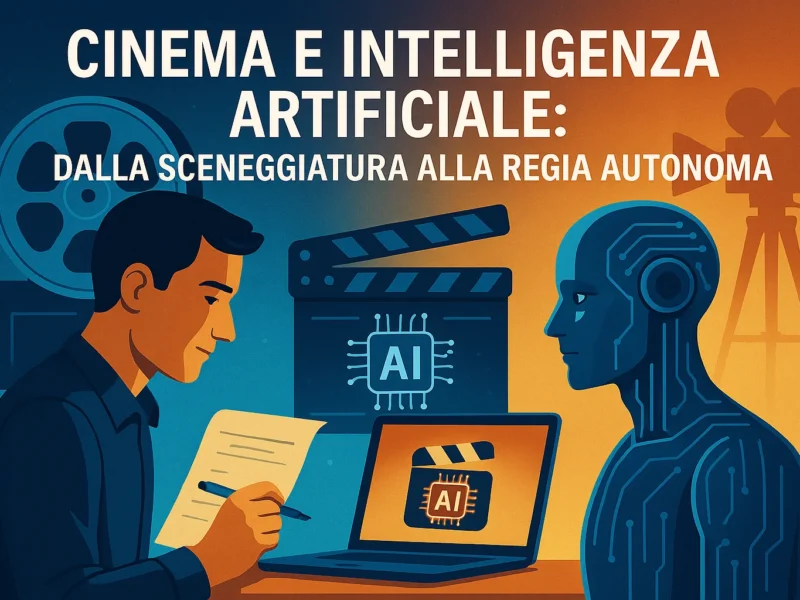When the AI writes film (really)
Have you ever watched a film and thought that some of the jokes seemed to be written by a robot? Maybe you were right. Artificial intelligence is entering fully into the world of cinema. And not only for special effects. Today he writes scripts, create storyboards, generate music, and even directs scenes. It is not science fiction anymore, it is already a reality.
What is the cinema algorithmic
The cinema algorithm is an evolution of the filmmaking process in which the artificial intelligence intervenes actively in the creation, production and post-production of a film. This is not only to use software to speed up the installation. We talk about AI that can write entire screenplays, suggest the shots, to create realistic visual effects or animate virtual characters.
An example? The short film Zone Outwritten entirely by an algorithm trained on hundreds of scripts. Or The Safe Zoneshot on the basis of indications that are generated by the system TO predictive.
In this scenario, the creativity is not just a human. Is hybridshared between the man and the machine.
From the script to the director: how it works
The AI applied to the cinema can be used in different phases:
- Automatic writing: algorithms, such as ChatGPT or Sudowrite can generate scripts from a texture base, mimic the style of famous writers or propose dialogues alternative.
- Storyboard and directed the virtual: tools such as Runway or DeepMotion transform script text in animated images or suggest the shots.
- Casting and production: AI can analyze your target audience to choose the actors or mount trailer custom, as is already the case in the marketing of blockbuster.
- Post-production: from color correction automated with the use of synthetic voices for dubbing, the applications are endless.
In our article AI and creativity: a comparison between generative art and human art we have already reflected on what it means to “create” a machine. The cinema is no exception.
Opportunities and challenges for the future of cinema
The most obvious advantage is the speed of production. A script that takes weeks can be generated in minutes. Also, the costs are lowered, making it accessible production in the creative independent.
But there are also critical issues. The first concerns the copyright. Who is the author of a screenplay written by an algorithm? The human who has provided the prompt? The programmer of the AI? The model itself?
Another problem is the risk of standardization narrative. If all TO learn from the film existing, will tend to play similar models, limiting the authentic innovation.
We talked about it even in the IA and copyright: the work is of who? and in the recent Ethics of Artificial Intelligence, where emerges the need for a collective reflection.
Real-world examples, and current innovations
Platforms TO build video as Pika Labs and Runway are transforming the animation, allowing anyone to create movies from the text.
Even Netflix has experimented with systems of AI to analyze the preferences of the users and produce tailored content.
In 2024, the Google DeepMind presented Veo 3, a model capable of generating high-quality video with camera movements are fluid, coherent narrative and a visual structure comparable to that of a real director. Veo 3 marks a decisive step towards the regia autonoma, demonstrating that the AI can not only support, but also orchestrate the creation of audiovisual content complex.
👉 Discover Veo 3 – Google DeepMind
Frequently asked questions (FAQ)
The artificial intelligence can direct a movie?
Until recently, the answer would have been “not yet.” But with the launch of Veo 3 by Google DeepMind, we're quickly changing the perspective. This new model not only generates realistic video, but it is able to compose sequences, visual complexwith camera movement, sophisticated, narrative coherence, and style director recognizable.
Is not a director yet complete, but we are very close.
👉 Discover Veo 3 – Google DeepMind
The film created with the TO the are original?
It depends. If the AI recombines existing content, the result can seem derivative. But if used as a creative tool, it can generate new works amazing.
The writers are in danger of being replaced?
The risk exists, but is more likely TO become a assistant creative, not a replacement. As in other areas, the collaboration man–machine is the key.
Conclusion: the seventh art in the twenty-first century
The cinema is changing, and artificial intelligence is one of the most powerful forces of this transformation. But we must not fear the end of cinema as we know it. On the contrary, we may be at the beginning of a new creative age, where human ideas and the ability computational blend.
The question is no longer “if” TO make film. But as it will. And, above all, what values and goals.
In the future, we may see the film written by and directed by an algorithm. But if you will be able to excite, maybe it doesn't matter who has signed for the film.
